Planting the Seeds of Success: The Irreplaceable Value of Preschool Education

Preschool is a vital stage in a child’s early development, blending learning with play under trained supervision. This blog highlights the importance of preschool education for a child’s emotional, social, and personal growth.
Building Trusting Relationships
Preschool offers young children the opportunity to interact with adults other than their parents, fostering the development of trusting relationships. This early exposure to structured settings helps children understand the importance of sharing and encourages their personal growth.
Enhancing Communication Skills
While children learn to talk at home, continuous interaction with peers and teachers in preschool enhances their communication skills. Through role plays, read-aloud sessions, and storytelling, children are exposed to rich language, which boosts their vocabulary and language skills.
Developing Physical Coordination Skills
Preschool activities involving running, climbing, art, and craft contribute to the development of physical coordination skills, hand-eye coordination, and fine and gross motor skills.
Nurturing Curiosity and Inquiry
As Albert Einstein aptly put it, “Play is the highest form of research.” In preschool, children explore their environment through guided and scaffolded play, fostering curiosity and a desire to inquire and discover.
Encouraging Symbolic Thought
Preschool years are essential for the development of symbolic thought, where children mentally represent concrete objects, actions, and events. Pretend play and creative activities help them express themselves symbolically.
Positive Effects on Development
Positive and developmentally sound early experiences have a profound impact on children’s social, behavioral, and cognitive development. A quality early childhood education builds readiness for learning and prepares children for future academic success.
Improved Social Skills and Self-Confidence
Researchers emphasize that early education results in improved social skills, fewer behavioral concerns, and better academic performance. Learning in a playful manner at preschool instills self-confidence and contributes to the child’s overall personality development.
Summing it up
Preschool education plays a pivotal role in a child’s development, offering unique opportunities for emotional, social, and cognitive growth. It provides a nurturing environment where children can explore, inquire, and develop essential skills that lay the foundation for lifelong learning.
